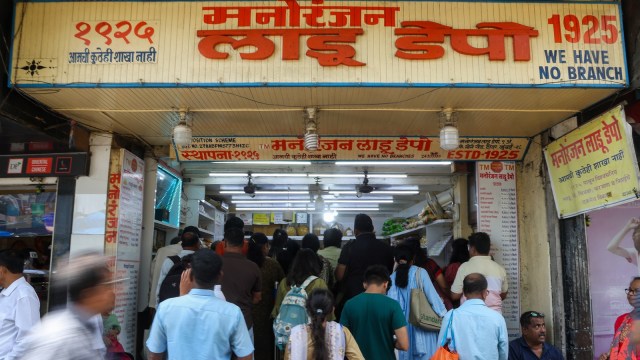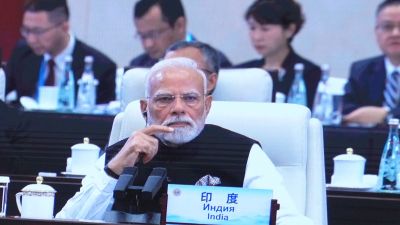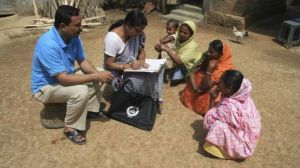Around Town: Five generations, countless laddoos, the story of 100-year-old Manoranjan Ladu Depot in Mumbai
Manoranjan Ladu Depot was started in the 1920s by Balkhandi Lal Mishra, who left his hometown of Kanpur for then-Bombay in search of a better livelihood.
 The story of Manoranjan Ladu Depo began in the 1920s, when a young Balkhandi Lal Mishra left his hometown of Kanpur for then-Bombay in search of a better livelihood. (Express photos by Akash Patil)
The story of Manoranjan Ladu Depo began in the 1920s, when a young Balkhandi Lal Mishra left his hometown of Kanpur for then-Bombay in search of a better livelihood. (Express photos by Akash Patil)In the days leading up to Ganesh Chaturthi, Mumbai’s most beloved 10-day festival, long queues form outside Manoranjan Ladu Depot, a no-frills sweet shop just a stone’s throw from the Puratan Vatvriksh Shree Hanuman Mandir in Dadar. Here, laddoos—also called ladu in parts of northern India—are the star attraction.
From the outside, the shop is marked by a simple Marathi signboard, with its name and the year of establishment, 1925, emblazoned in bold. Another detail is highlighted prominently in both Marathi and English: they have no other branch.
Inside, three generations of the Mishra family, alongside a small team of workers, work in tandem to serve the hundreds and thousands who come from across the city for modaks, kadak boondi laddoos, soft boondi laddoos, besan laddoos, and an array of farsan (savoury items).
The story of Manoranjan Ladu Depot began in the 1920s, when a young Balkhandi Lal Mishra left his hometown of Kanpur for then-Bombay in search of a better livelihood.
 Three generations of Manoranjan Ladu Depot in one frame. (L-R) Hitendra, Sunil, Divyansh, and Vinod Mishra. (Express photos by Akash Patil)
Three generations of Manoranjan Ladu Depot in one frame. (L-R) Hitendra, Sunil, Divyansh, and Vinod Mishra. (Express photos by Akash Patil)
“He started by selling chivda. He would buy a full thali for Rs 2 and sell small portions from it for one, two, or four annas. Some years later, he learnt of this shop being available for sale and bought it,” recalls his grandson, Vinod Kumar Mishra, 88, pointing to the current premises. “He named it Manoranjan and started selling chivda here.” Balkhandi’s son, Gaya Prasad Mishra, carried forward the business until his untimely death in 1945.
Vinod, dressed in a crisp white dhoti-kurta and chewing on supari, was only eight when his father passed away — too young then to take charge. For a few years thereafter, the family entrusted the shop to a Maharashtrian gentleman from Malvan, who introduced kadak boondi laddoos to Manoranjan’s offerings. “When I returned to the shop around 1956, he was kind enough to share the recipe with me,” Vinod added. The rest, as they say, is history.
Over time, production shifted from a modest unit at the shop itself to separate manufacturing units as demand grew. Vinod also expanded the menu, adding varieties such as dink (gond or edible gum), nachni (ragi), narm boondi, methi, and besan laddoos, catering to every palate and occasion. Later, his sons — Sunil, 59, Hitendra, 55, and Chetan, 53 —joined the business, introducing a wide range of farsan, including chakli and namkeens. Chivda, the product that started it all, continues to be one of their mainstays.
 Apart from modak, Manoranjan Ladu Depot offers dink (gond or edible gum), nachni (ragi), narm boondi, methi, and besan laddoos, catering to every palate and occasion. (Express photos by Akash Patil)
Apart from modak, Manoranjan Ladu Depot offers dink (gond or edible gum), nachni (ragi), narm boondi, methi, and besan laddoos, catering to every palate and occasion. (Express photos by Akash Patil)
“We have a business that runs throughout the year. While Ganesh Chaturthi brings the longest queues for our laddoos and modaks, Diwali is also a very busy season,” shared Hitendra. His son, Divyansh, 28, now represents the fifth generation in the family business.
The shop opens daily from 8 am to 9 pm, except on Mondays. During major festivals like Ganpati and Diwali, even Mondays are working days.
When asked about the secret to their success, Hitendra was quick to note, “What does a customer want? Genuine products at competitive prices and at a place where they are treated well. We tick all three.” He then added: Our ladoos are priced at Rs 440 for 100 pieces, which is nearly 3 kg against Rs 250 per kg that most charge around us. Our modaks are made only from mava and sugar and are priced at Rs 560 a kg against Rs 800 elsewhere.”







